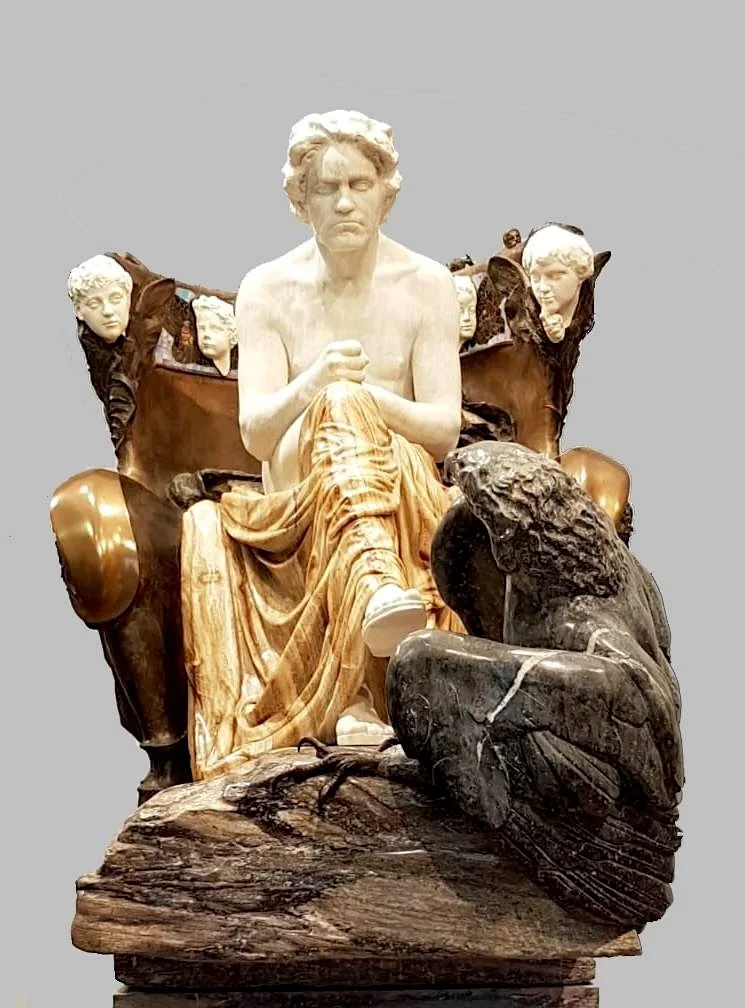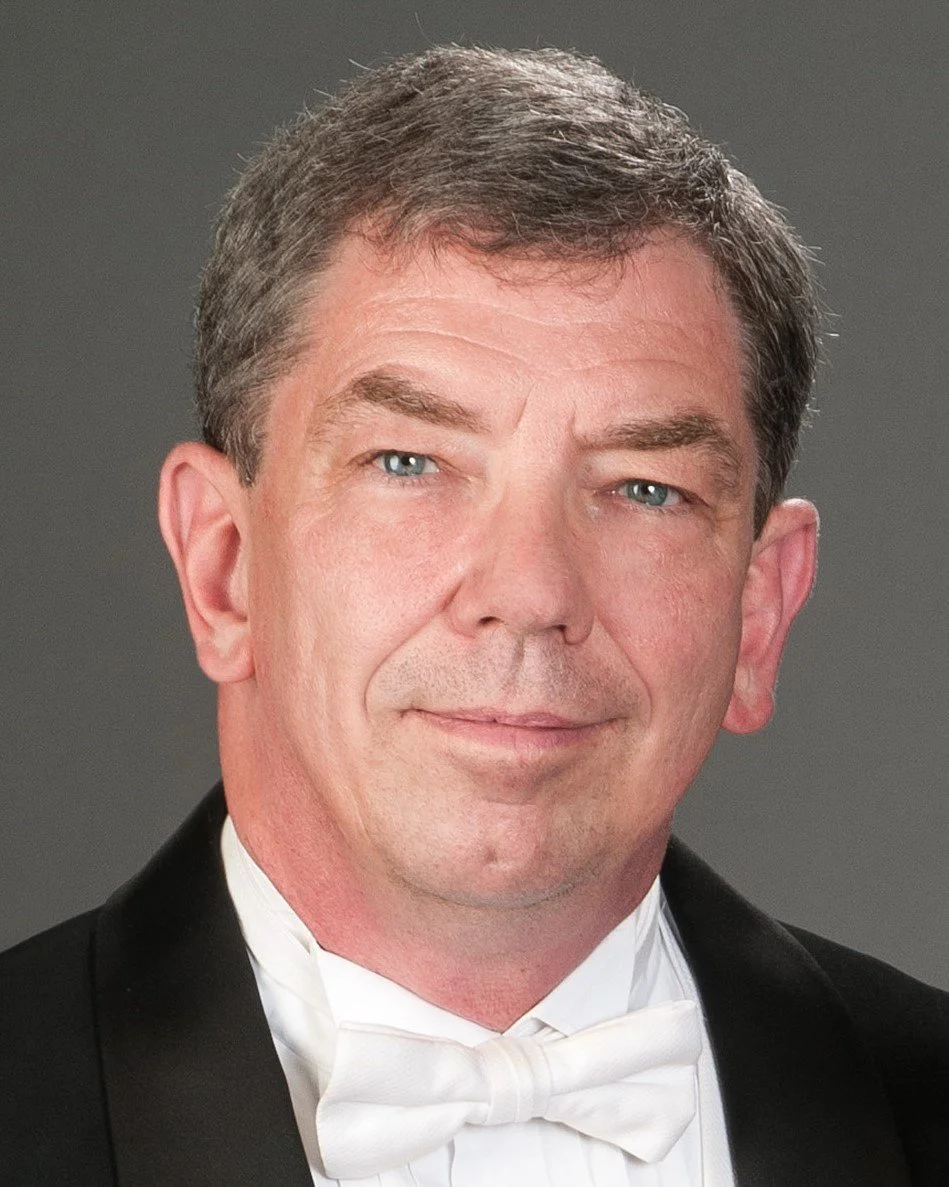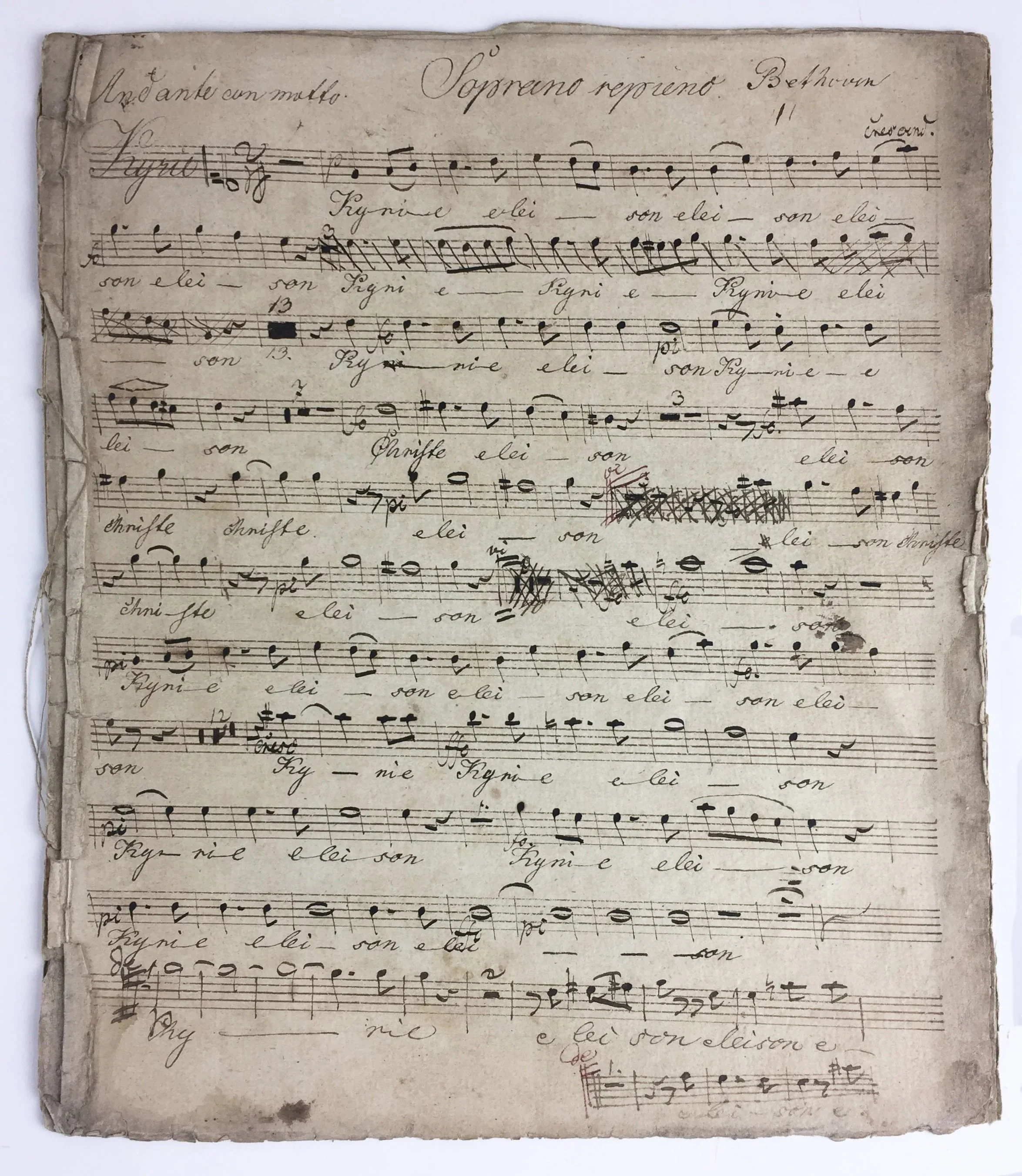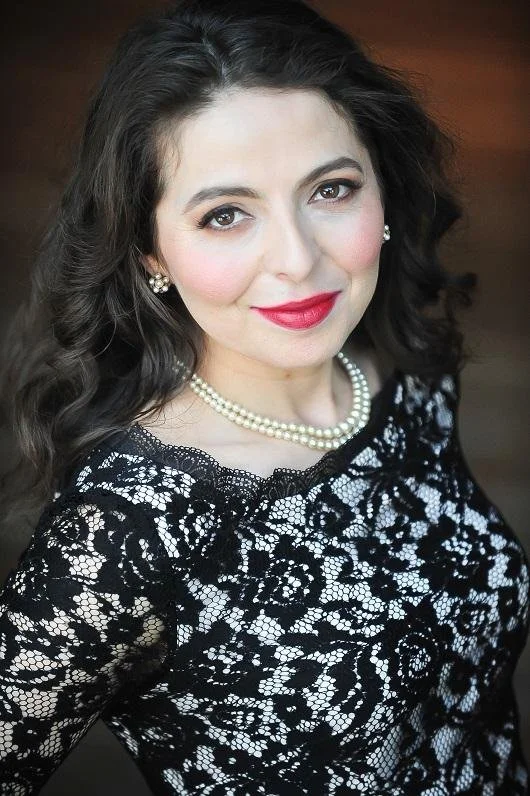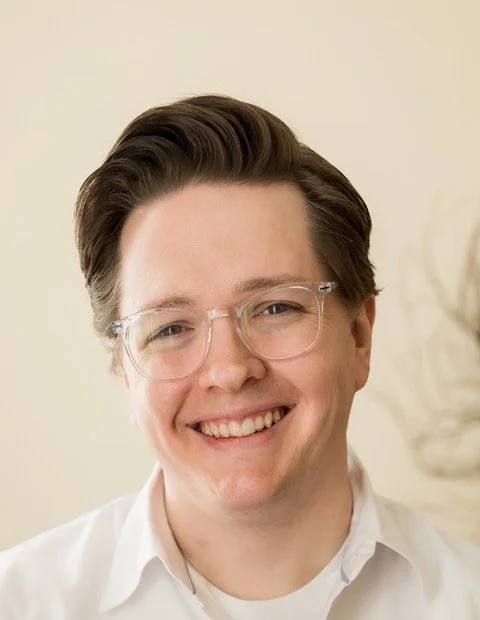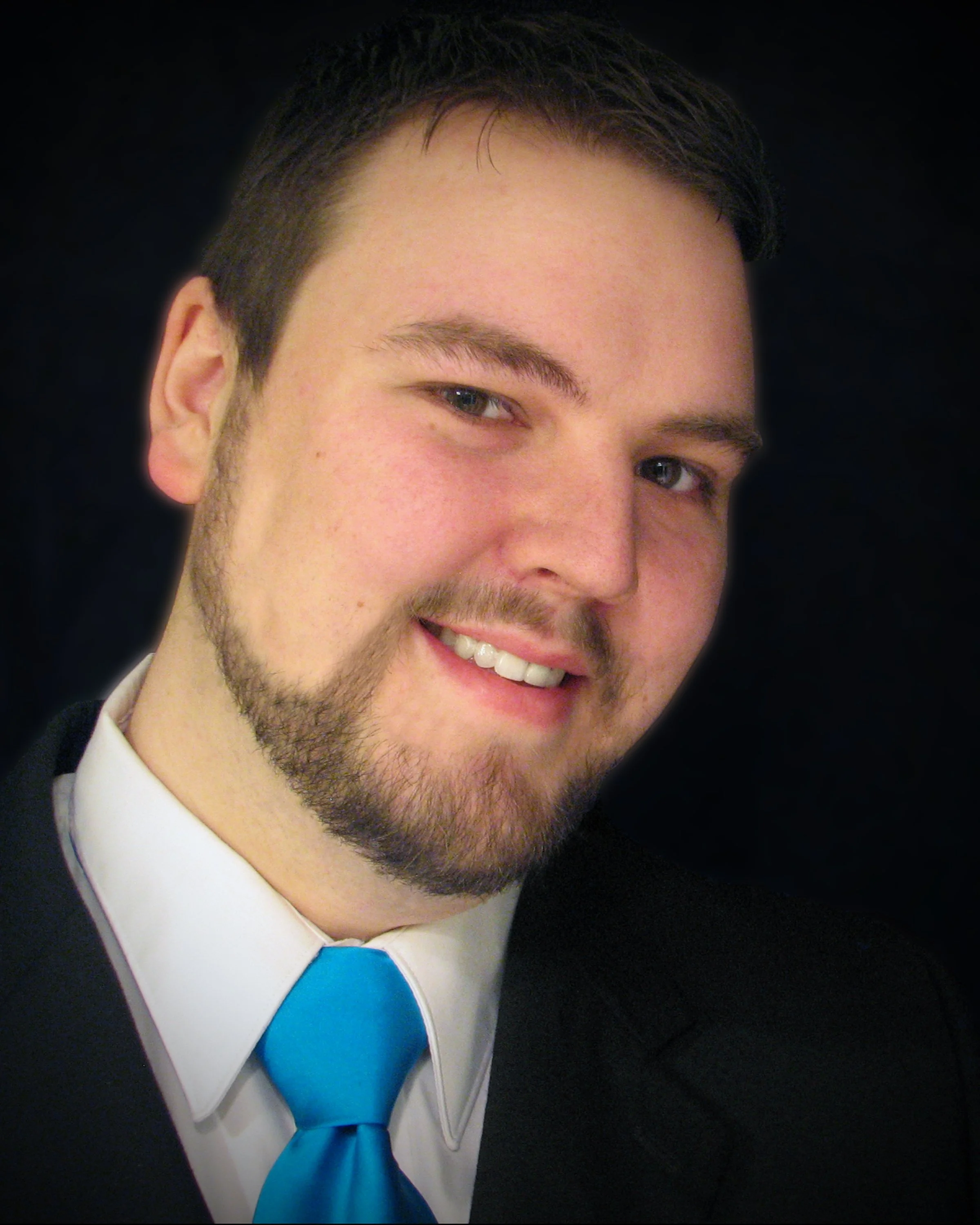THE SPIRITUAL ECSTASY OF BEETHOVEN
Summer Singers to Perform Sacred Masterpieces
By Patrick Neas, KC Arts Beat
Beethoven by Max Klinger
“The vibrations on the air are the breath of God speaking to man's soul. Music is the language of God. We musicians are as close to God as man can be. We hear his voice, we read his lips, we give birth to the children of God, who sing his praise. That's what musicians are.”
— Ludwig Van Beethoven
Compared to his contemporaries like Mozart, Haydn and Schubert, Beethoven did not compose an extraordinary number of explicitly sacred works, although many of his secular works are infused with a yearning and an exalted spirituality.
The Summer Singers of Kansas City led by William Baker will give full expression to the spiritual side of Beethoven in both his sacred and secular music at 2 p.m. Aug. 17 at Grace and Holy Trinity Cathedral. The 140-voice choir and 28-piece orchestra will be joined by soprano Victoria Botero, alto Karen Kelley, tenor Zachary Devin and bass Joshua Markley to perform Beethoven’s Symphony No. 7 in A, the Mass in C and the Hallelujah from Christ on the Mount of Olives.
William Baker has had a profound and intimate relationship with Beethoven since his time singing with the legendary choral conductor Robert Shaw.
“I remember a letter that Robert Shaw wrote to the chorus when we were doing the Missa Solemnis,” Baker said. “He talked about how Beethoven is direct, he's emotional. He said Beethoven's theology must have been ‘Enter ye into the gates on horseback.’ His music has a tenderness, it has a beauty, it has a vulnerability, it has a spirituality, but it also has a affirmation and drive of argument. Beethoven announces his presence with authority. And I think in this program we have that contrast. The Seventh Symphony, to my mind, is a very optimistic and joyful piece. Wagner called it the apotheosis of the dance.”
The Symphony No. 7 was first performed in Vienna on Dec. 8, 1813. It was part of a charity concert for soldiers wounded in the Battle of Hanau, part of the Napoleonic Wars. Beethoven himself was the conductor and the orchestra included some of Vienna’s most acclaimed musicians, like violinist Louis Spohr, composers Johann Nepomuk Hummel and Antonio Salieri and the guitar virtuoso Mauro Giuliani, who played cello.
The symphony was immediately embraced by the Viennese, with the audience demanding the second movement, Allegretto, be encored on the spot.
Beethoven himself considered it “one of my best works,” and the concert was likely the most successful of his lifetime. The final movement is truly some of the most thrilling music ever written.
“Beethoven was not considered a great conductor because he would jump up and down and gesture wildly and spread his arms out,” Baker said. “He had a good time, but the orchestra had to play around him. Maybe they'll say that about me too.”
Baker says that he finds it challenging as the conductor not to get carried away by Beethoven’s rapture.
“You cannot avoid getting swept up into it,” he said. “The first movement is such a strong statement, and the second movement is so beautiful, the way that it is constructed and the way that the melodic figures interweave. And that last movement is so ecstatic that on the podium sometimes it is difficult to not get swept up in it. You have to keep your pulse pounding, but you have to keep your brain cool when you're conducting it.”
Ludwig Van Beethoven
The Mass in C
Dr. William Baker
Unlike other composers of the classical era like Mozart, Haydn, and Schubert, Beethoven didn't write a great number of sacred works. He had an inner struggle with spirituality and religion that maybe these other composers did not have. Perhaps they had a more uncomplicated relationship to the divine and spirituality and organized religion. But that doesn't mean that Beethoven was any less spiritual, but there was something unconventional about his spirituality.
“Beethoven did struggle with his faith,” Baker said. “There were times when he railed against the idea of God, and there were times when he said that God was whispering the music in his ear that would come out of his pen. I think that's one of the reasons that when he was confronted with his deafness, he did not commit suicide as he had considered.”
Alongside his Missa Solemnis, Baker sees the Mass in C as the great exemplar of Beethoven’s spirituality.
“One of the things about Beethoven is he gets you to the point where you go beyond words,” Baker said. “You cannot describe how it lifts your spirit. I’m a religious man myself, and I absolutely believe that the miracle of Beethoven's compositions and their diversity, variety and power had to be placed on his heart by somebody bigger than you and I. If Beethoven had never written the Missa Solemnis, I think the Mass in C would be much better known. But it lives in the shadow of the Missa Solemnis, which arguably could be considered one of the ten greatest artistic and expressive achievement of Western man.”
Beethoven composed the Mass in C in 1807, commissioned by Prince Nikolaus Esterházy II for the name day of his wife, Princess Marie Esterházy. Beethoven, known for his symphonies, brought a unique voice to the sacred genre, blending classical forms with his developing Romantic style. The premiere, however, was met with mixed reactions. The prince reportedly expected something more traditional. But over time, the Mass in C gained recognition for its originality and emotional depth. It’s a fascinating piece in Beethoven’s oeuvre.
Soprano part from Beethoven’s Mass in C in a copyist’s hand.
“Haydn wr0te a Mass to commemorate Princess Marie’s name day every year, and by 1807 or the early 1800s, Haydn had gotten to the point where his health would not permit him to do that,” Baker said. “So Prince Esterházy turned to Beethoven. Beethoven considered his attempt to write this Mass to be a great tribute to Haydn. Beethoven had a great admiration for Haydn's sacred music. Obviously he put his own mark on it and he wanted to carry it in some new directions, which did not please Esterházy, but for Beethoven, this was very much a tribute to Haydn.”
Beethoven’s Mass in C broke away from the usual grandeur and drama of the time. He focused on simplicity and clarity, emphasizing the emotional and spiritual aspects. His personal style of expression and use of dynamic contrasts set it apart. It was a fresh take, reflecting his evolving Romantic sensibilities.
“As the Summer Singers have worked with the piece this year — and this is a very strong Summer Singers group — we’ve been able to talk a lot about nuance and about the expressive nature of how Beethoven created this,” Baker said. “As is the case of many great composers, there's not one note of filler. Every phrase in the work is packed with emotional and spiritual import.”
Victoria Botero
Karen Kelley
Zachary Devin
Joshua Markley
The concert will conclude with a short but powerful work, the Hallelujah from Christ on the Mount of Olives.
“Even the greatest composers can write some lousy music,” Baker said. “And a lot of Christ on the Mount of Olives, in the opinion of many, including myself, is that it's just not a very strong piece of music. Beethoven himself said that the text was terrible. Why he chose to do it, I don't know. It's the only oratorio that he composed. I think at that point he decided that he would leave the oratorio business to Handel and Haydn. All of that said, the Hallelujah that concludes it is majestic and wonderful and powerful and glorious and almost every church choir of merit on the planet has sung it. I've probably conducted it over 150 times in my life, at church and in concerts. And it makes a great exclamation point on this concert.”
Beethoven may not have been a perfect man or even a perfect composer, but one can tell that Baker has boundless admiration for his cantankerous, contrary and brilliant nature.
“I've grown to love the guy, I really have,” Baker said. “I've grown not to just admire him and respect him, but I've grown to love him. In all of his rough edges, and all of his questions that for him were never answered. What a great spirit, what a great heart. And you hear that heart in the second movement of the Seventh Symphony, you hear that heart in the Agnus Dei of the Mass. And if you listen carefully, you'll love him too.”
The Summer Singers Celebrating Beethoven
2 p.m. Aug. 17 at Grace and Holy Trinity Cathedral, 415 W. 13th St. $33.85 - $108.55
For tickets and more information, www.festivalsingers.org

